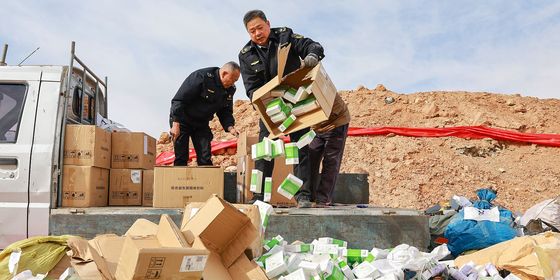Our guide to identifying and dealing with common phone scams
“Hi, it’s Little Zhang, your long-lost friend from middle school! Listen, can you do me a favor?” comes the voice over your phone. It may at first sound like the rekindling of a beautiful old friendship, but wait...you don’t remember this Zhang guy, he’s calling on a “withheld” number, and now he’s asking for cash for emergency surgery.
That’s right, “Little Zhang” is actually a fraudster, and his ploy is common. Phone scams cost people and businesses in China over 35.3 billion yuan in 2020 alone according to Jiemian News.
Scammers have become increasingly sophisticated since the days they just rang up out of the blue and asked for money. Now, they may know almost everything about you: your name, address, workplace; even the names of people on your phone contact list from the times you helpfully splashed those details on social media or gave various apps access to your data. They are also experienced emotional manipulators, easily appealing to your good nature, and even predicting your reactions, becoming friendly or threatening in turn in order to convince you that you absolutely must hand them your hard-earned money.
Congratulations!
Who hasn’t dreamt of winning the lottery? Scammers are well aware of those dreams of riches, and use the prospect of big prizes to get your money into their pockets. Don’t fret, they claim on the phone or by text: You are the “prize-winner,” and will receive your handsome reward just as soon as you pay a small “administrative fee”:
Congratulations! You’ve won 50,000 yuan in the Haoduoyu Supermarket tenth anniversary lottery draw! All you need to do is pay 2,000 yuan in tax to receive your prize!
恭喜您获得好多鱼超市十周年庆典抽奖活动一等奖五万元现金,您只需缴纳2000元税费即可领取该现金红包。
But, how strange, you can’t seem to remember signing up for this lottery… Ask the alleged prize-givers to take the fee out of your “winnings” and see how they respond:
You can just deduct the amount from my prize-winnings.
你们直接在奖金里扣就可以啊。
False Identities and Fake Emergencies
Scammers commonly pretend to be “authorities,” such as police officers or bank workers, or impersonate long-lost friends to pressure the caller. Beware of old friends, neighbors, or classmates who claim to be in a dire situation and in need of immediate financial assistance. Common ploys include claiming to need emergency surgery, or just being “in trouble,” with the scammer always claiming they will pay the money back in no time. Treat emergency requests with caution, and verify the caller’s reliability, preferably by organizing a face-to-face meeting:
Zhang, I’m in a spot of bother, I really need some money. Help a brother out?
老张啊,最近出了点事儿,急用钱,借哥们儿点儿。
It’s not good for our relationship to discuss money online. Let’s meet this afternoon and talk it over.
线上谈钱伤感情,咱今天下午见面细聊。
Scammers come up with all kinds of “urgent situations” to steal your money, from car accidents to flooding. Be sure to take a moment and verify their claims; find time to think it over with some excuse to get off the phone:
I’m your son’s roommate. He was in a car accident and is being rushed to surgery right now! Please transfer money to this account as soon as possible!
我是您儿子的室友,他出车祸了,在医院抢救要用钱,赶紧把钱打到这个账户上,要快!
I’m driving right now. I’ll call you back after a while.
我正在开车,一会儿到了给你们回过去。
Group Fraud
Scammers may attempt to head-off your attempts to verify information by working in gangs, with each member playing different roles, ranging from civil servants to lawyers to make it harder for vulnerable victims to resist their advances. In most situations, it’s best to ask for face-to-face meetings, and stop any potential scam conversations as early as possible, before the fraudsters have a chance to use emotional blackmail.
This is your telecom company. Your personal information has been compromised and misused by others. I’ll help put you in touch with the Chaoyang police station now.
我是电信公司,您的身份信息被人冒用,现在帮您把电话转接到朝阳公安局。
The supposed “police officer” will be another member of the gang, who will potentially send you a link to a third-party platform for registration that is actually run by themselves, and so forth.
You can just come to me in-person, it’s not easy to understand over the phone. Or I can come to your office.
直接来找我调查吧,电话里说不清楚。我去你们单位找你也行。
Tricks and Social Engineering
Sophisticated scammers will often use verbal gymnastics and social engineering to get you to reveal information about yourself, thus making their scam more convincing. For example, they won’t usually state their name, but call themselves something generic like your “boss,” your “cousin,” or your “child”:
Hey, it’s your cousin.
喂?是你表兄。
Oh, Cousin Zhang?
啊?张哥?
You’ve just fallen into the trap—now that the scammer knows you have a cousin named Zhang, they can play on your emotions to get what they want, and you will be tricked into trusting them. A better response would be to intentionally reveal the wrong information—say, by referring to the caller or texter by the wrong name or gender—to test if they’re really who they say they are:
Mom, are you there?
在吗,妈?
What’s the matter, son?
怎么了,儿子?
I want to sign up for a summer camp, can you transfer me some money?
我想报个夏令营,转我点钱呗。
My child is a girl! Go take your scam somewhere else!
我的孩子是女孩!骗别人去吧。
An official-sounding call or text made from a private number nearly always indicates a scam, so be sure to verify the caller’s identity.
Hello, this is the post office. I’m afraid your parcel was lost in transit. Please add our representative on WeChat and scan the QR code so we can compensate you.
您好,这里是邮局,您的包裹在运输途中意外丢失,请您添加这边微信,扫描二维码,以便理赔。
If you’re from some official bureau, then why are you using a private number?
你们既然是什么什么局的,为什么要用私人电话给我打?
Escalating Threats
The previous techniques rely on appealing to a victim’s good nature or desires, but sometimes scammers will become aggressive in order to pressure you into giving them money. The fraudster may say they are a government official or a member of law enforcement—perhaps even claiming to be investigating fraud—and ask you to provide details of your bank account or send them payment, with the threat of arrest if you refuse. To convince you, they may also confirm your ID card number, address, and even provide a “wanted” poster of you, allegedly issued by some government agency. But, remember, government officials never call individuals and request their money over the phone:
This is the Chaoyang police station. You are suspected of money laundering. Please transfer your money to this safe account we have provided.
这里是朝阳公安局,你涉嫌洗钱,请你将银行的钱全部转到我们提供的安全账户内。
Then just freeze my account. If there is a problem, I’ll call the police myself.
直接冻结吧,有问题我会报警的。
Accents and Errors
Callers who claim to be high level government employees but have heavy accents could be scammers, since standard Mandarin is required for civil servants. Likewise, if callers make basic errors about which government agency, well-known company, or law enforcement branch they claim to be representing, then there’s a high likelihood that they are fakes.
Hello, this is the customer service center of “Estea Launder.” We are checking in with our customers. Have you ever had any allergic reactions to our facial products? If so, we will compensate you.
您好,我是亚使兰黛网店客服,目前我们在做回访,您在我们店里购买的面霜出现过敏情况了吗?如果存在这种情况,我们会给你补偿。
You can’t even write your own brand name correctly. Why are you trying to scam me?
你自己品牌都写不清,干什么不好非要干诈骗。
End of the Line: How to Beat China’s Scam Callers is a story from our issue, “State of The Art.” To read the entire issue, become a subscriber and receive the full magazine.












